- Home
- Anne Bennett
Pack Up Your Troubles
Pack Up Your Troubles Read online
Copyright
Published by HarperCollinsPublishers Ltd
The News Building
1 London Bridge Street
London, SE1 9GF
www.harpercollins.co.uk
This edition published by HarperCollinsPublishers 2016
Copyright © Anne Bennett 2000
First published in 2000 by HEADLINE BOOK PUBLISHING
Cover design © HarperCollinsPublishers Ltd 2016
Cover photographs © Gordon Crabb (woman); John Topham /TopFoto (street scene).
Anne Bennett asserts the moral right to be identified as the author of this work.
A catalogue copy of this book is available from the British Library.
This novel is entirely a work of fiction. The names, characters and incidents portrayed in it are the work of the author’s imagination. Any resemblance to actual persons, living or dead, events or localities is entirely coincidental.
All rights reserved under International and Pan-American Copyright Conventions. By payment of the required fees, you have been granted the non-exclusive, non-transferable right to access and read the text of this e-book on screen. No part of this text may be reproduced, transmitted, down-loaded, decompiled, reverse engineered, or stored in or introduced into any information storage and retrieval system, in any form or by any means, whether electronic or mechanical, now known or hereinafter invented, without the express written permission of HarperCollins.
Source ISBN: 9780007547807
Ebook Edition © March 2016 ISBN: 9780007547814
Version [2016-02-17]
Dedication
I am dedicating this book to Denis
for the immense help and unfailing support
he has given me over the years.
Thank you.
Table of Contents
Cover
Title Page
Copyright
Dedication
Chapter One
Chapter Two
Chapter Three
Chapter Four
Chapter Five
Chapter Six
Chapter Seven
Chapter Eight
Chapter Nine
Chapter Ten
Chapter Eleven
Chapter Twelve
Chapter Thirteen
Chapter Fourteen
Chapter Fifteen
Chapter Sixteen
Chapter Seventeen
Chapter Eighteen
Chapter Nineteen
Chapter Twenty
Chapter Twenty-One
Chapter Twenty-Two
Chapter Twenty-Three
Chapter Twenty-Four
Chapter Twenty-Five
Chapter Twenty-Six
Chapter Twenty-Seven
Chapter Twenty-Eight
Chapter Twenty-Nine
Chapter Thirty
Acknowledgements
About the Author
Also by Anne Bennett
About the Publisher
ONE
Maeve Brannigan couldn’t believe she was actually leaving the little farm in Donegal where she’d lived all of her eighteen years. It had been worth the cajoling and pleading, her mother’s tears and her father’s bad humour that had made him moody and snappy with them all. She’d survived it all, as well as the old biddies in the parish, who’d prophesied that no good would come of it, and did she think she ought to go when, after all, she was such a grand help to her mother, for wasn’t the woman herself always saying so?
Maeve had been brought up to have manners and it had only been that innate politeness that had stopped her screaming abuse at the interfering old gossips. Did they think she didn’t know all that? She was the eldest of seven and even when Maeve had begun work in the grocery store in the town when she was fourteen, there had always been a list of chores for her at home.
Well, now it was the turn of Kate and Rosemarie, who at eleven and twelve years of age were well able for it. Maeve was sick of being at everyone’s beck and call; fed up with the isolated farm, and of the suffocating small town where everyone knew everything about you and yours. Her total social life revolved around church activities, and the weekly dance, held only in the summer months, where she met boys she’d known for years, as familiar to her as her brothers and just as exciting. Few of them had any ambition and were content to live in Ballyglen all their lives, and expected the wives they would eventually take to be satisfied with that situation too.
Maeve decided it wasn’t for her. But she wasn’t to go to Dublin, or ‘God forbid’ London, a desperate place altogether, her parents claimed, and where she knew not a soul. No, she was to go to Birmingham where Maeve’s mother, Annie, whose maiden name had been O’Toole, had a brother called Michael.
Maeve knew of her Uncle Michael, though she’d never met him. He’d been in Birmingham since early 1919, when he’d met and married his English wife, Agnes, in just a couple of months, and had never been home since. Maeve also knew that no obstacles had been put in the way of his leaving his home, but in fact the reverse. He’d served in the British Army in the Great War and had come back in late 1918, a bitter and disillusioned young man. Ireland was in disarray, the troubles at their height and rebel gangs roaming the country. His family, terrified he’d be caught up in it all, had encouraged Michael to accompany a neighbour catching the emigrant boat for England. He’d ended up in Birmingham and had got a job – a grand job he’d said, in a foundry. But he was still Annie’s little brother and she wrote him regular letters of the family, and now was sure Maeve could lodge with him to see how she liked the place. In fact Michael had written her a very long, encouraging letter. Not only could she stay with them and welcome, he said, he could even get her a waitressing job in a café. He knew the owner, a Greek man by the name of Dolamartis, a good Catholic, and they went to the same church. He’d told Michael his assistant was leaving. Jobs were hard to find, her uncle said, and Maeve couldn’t afford to be too choosy. Maeve had no intention of being choosy at all and at the mention of a job and place to stay, her parents’ resistance finally crumbled. Maeve was on her way.
They were all there that early spring morning with the mist still swirling around the hills, to put her on the little rail bus that ran at the bottom of Thomas Brannigan’s farm, to start the first leg of her long journey. She saw her mother holding little Nuala’s hand and dabbing at her eyes with her apron, her father, his face still in stiff lines of disapproval, and the others staring at her as if they couldn’t quite believe she was going. Maeve knew her father didn’t want her to go, in fact he dreaded it, and in a way she understood why. She knew she had a special place in her father’s heart, partly because she looked so like her mother and also because she was the firstborn. She also knew it had been her mother who’d persuaded her father to allow her to go, and if she hadn’t supported her, it would have been far more difficult.
The way he’d gone on, it was as if he expected her to be leapt on by every man in Christendom as soon as she left the farm. She knew the lads all had an eye for her; she wasn’t stupid. But her mother had talked to her, and anyway, she knew right from wrong. So though she felt sorry for her parents, she couldn’t wait to be gone.
Maeve watched until the group by the farm gate had become like small dots and then she settled into her seat with a sigh of contentment. Excitement fizzed inside her so that she could hardly sit still. She wished she could snap her fingers and be in Birmingham, where she was sure everything that was good awaited her.
She sustained the excitement all the way to Belfast, though the size and noise of the station unnerved her. The clatter of the enormous trains that seemed to hurl into the station to stop with a hiss of steam and a piercing screech
and a whistle made her jump more than once. She left the busy Belfast station for the ferry, feeling apprehensive about the journey across the water.
Maeve boarded with what seemed like thousands of other people crowding on to the gangplank, her case bumping against her knees. Once on board, she made her way on to the deck and, putting her case beside her, she held tightly to the rail as she watched the shores of Ireland fade into the distance and then disappear altogether. She felt quite suddenly unexpectedly desolate and a little frightened. The overcast leaden grey skies belied the fact that it was early April and although it was midmorning the light was as poor as dusk, which didn’t help Maeve’s mood. Nor did the roll of the ship and the churning of her stomach.
She leant over the side, overcome suddenly by nausea, and vomited all she’d eaten that morning into the white-fringed grey water crashing and foaming against the ferry’s sides. She continued to retch over and over and she realised she wasn’t the only one.
When eventually her nausea was over and as she wiped her mouth with a handkerchief she became aware of a dumpy little woman dressed in black watching her. The rain came then, not soft spring rain, but sharp shafts that stung Maeve’s face and soaked her coat in minutes.
‘Come away into the bar,’ the woman told her, lifting her case as if it weighed nothing at all. ‘You’ll freeze to death out here.’
Maeve allowed herself to be led indoors, where she was met by a cacophony of people talking, laughing, shouting and quarrelling, and here and there she heard snatches of songs, the laments of the emigrant Irish that brought tears to her eyes.
‘Tch tch, that won’t do,’ the woman said. ‘You need a brandy to buck you up. I’ll send my Sean to get you one.’
Maeve’s protests were waved aside and the woman escorted her to where a man also dressed in black sat on a suitcase just a little way from the bar.
‘Sit down,’ the woman commanded and, as the seats were all occupied, Maeve upended her case and sat on that.
The woman introduced herself as Minnie O’Rourke, and her husband, whom she dispatched for the drinks, as Sean. They were returning from a funeral for Sean’s parents, who’d died within days of one another on the family farm in Galway. The farm now belonged to Sean, Minnie O’Rourke explained, though his three sisters ran the place. Maeve, having told her new acquaintance her own name, smiled politely and hoped the brandy would ease the cramps in her stomach.
The bar reminded her of Donovan’s in her home town, with the tobacco stench that stung Maeve’s eyes and hung like a blue fog over the room, together with the familiar smell of Guinness. Sean O’Rourke returned with two glasses of the black drink with the creamy white top for himself and his wife, and a large brandy in a balloon glass for Maeve.
Maeve looked at it fearfully. Never had she had any strong drink, except the odd sip of her father’s Guinness, which he’d allowed her at Christmas and which she’d not liked. The brandy caught in her throat and caused her to cough and splutter, and Minnie O’Rourke patted her back and with a smile told her to treat the drink with respect and sip it.
And Maeve did sip it, grimacing at the taste as one might at foul-smelling medicine that promises to do some good, but she did like the warm glow that the brandy induced.
‘That’s brought the colour back to your cheeks anyway,’ Minnie O’Rourke told her. ‘Where are you bound for?’
‘Birmingham,’ Maeve said. ‘To my uncle’s place.’
‘Well, isn’t that good news?’ Minnie exclaimed. ‘We’re going to Birmingham too. We have a fine house in Erdington. You’d best come along with us. It’s desperate altogether travelling on your own.’
And Maeve was glad to have their company. It might stop her feeling fearful that she was making some dreadful mistake. She was also anxious to learn as much as she could about the city she was going to.
‘Are you having a holiday?’ Minnie asked.
‘No,’ Maeve said. ‘I’m staying there. My uncle has got me a job in a café, near a place called Aston Cross.’
‘My! You’re lucky,’ Minnie said, ‘for God knows, jobs are few and far between at the moment, with the slump after the war, you know?’ Without waiting for a reply she went on, ‘My Sean had to have his gaffer’s word that he’d have a job to go back to, or we wouldn’t have been able to go to the funeral at all. Even then we could only take three days. His sisters wanted him to take three or four weeks, but we daren’t, and he’s a skilled man. He works in the brass industry.’
Maeve made no reply to this, for she was suddenly unaccountably weary and her head swam with the unaccustomed brandy on her empty and very sore stomach.
‘Still and all, you have a job to go to, that’s something,’ Minnie went on.
‘He knows the owner of the place,’ Maeve said.
‘That would be the way of it, right enough,’ Minnie said. ‘As I always say, God’s good.’
Maeve opened her mouth to make some sort of reply, but all that came out was a large yawn.
‘My, my,’ said Minnie. ‘You’re dead beat, so you are, and no wonder after you being so sick and all. Lie yourself down across the cases and have a wee sleep, why don’t you?’
What a relief it was, Maeve found, to lay her swimming head down, even across the lumpy hard cases, and pull up her legs to ease the cramps and close her eyes to ease the throbbing pain in her head. In minutes she was fast asleep.
She slept till the ferry docked. The O’Rourkes shook her awake and took her in hand, and she shambled behind them in the damp rain-soaked air, pushing her case before her as people thronged the decks in the rush to embark. They were waved through the customs sheds and into the noisy station in Liverpool that was teeming with people. Not that Maeve saw much of it, for the train was in and the O’Rourkes, seasoned travellers that they were, steered Maeve quickly through the crowds and on to the train to make sure of a seat, and Maeve was glad they had when she saw many passengers filling the corridors later, sitting astride their cases.
She was glad that on dry land once more she was feeling much better and able to face the picnic her mother had packed with such loving care early that morning. She shared it with Sean and Minnie O’Rourke while she plied them with questions about the city she was to live in. And as the train chugged its way southwards, they told her of Birmingham’s cinemas and dance halls, which opened all year round. They described the music halls and the Bull Ring, a huge shopping centre where great entertainment could be had, they said, on a Saturday night. Maeve was no longer nervous; instead she was in a fever of excitement to get to her uncle’s house and begin her job. Then, she was sure, her life would take an up-turn.
When Maeve and the O’Rourkes finally alighted at New Street station, Maeve wondered if she’d ever find her uncle in such a loud and busy place. All around her was the noise of people. Porters pushing laden trolleys were yelling out warning to anyone in their way, and at a newsstand, a vendor shouted his wares, while beside her the gigantic train was giving little pants of steam, as if it were an untamed animal out of breath.
Her Uncle Michael told her afterwards he’d have recognised her anywhere from the one photograph she’d ever had taken, which she’d sent to him. He’d said the photo didn’t do her justice and he’d commented on how like his sister Annie Maeve was. He could remember how stunning his sister had been at Maeve’s age, and how she’d had the pick of the local suitors. He could see that Maeve had the same-shape face with the high cheekbones, blue eyes, straight nose and full mouth. They even had the same way of holding their heads and once had had the same-colour hair, but Maeve’s mother’s blonde locks were now peppered with grey. She wore it in a bun on the back of her neck and for the journey Maeve had copied her, feeling the style made her look more adult.
Maeve was pleased and relieved at her uncle’s warm greeting. He pushed her extended hand aside and enveloped her in a big hug. His coat was scratchy and smelt of greasy dirt with a hint of tobacco, but none of that mattered. Maeve felt sh
e was with one of her own, and tears of exhaustion and emotion welled up in her eyes. Not that she let them fall. This was her great adventure just beginning – no time for crying and carrying on, she told herself sternly.
She wiped her eyes surreptitiously and turned to the O’Rourkes, who were looking on in satisfaction at the respectable uncle, whom they thought a very suitable man indeed to look after the young Maeve Brannigan.
Michael shook hands with the two people that his niece had introduced him to, and thanked them sincerely for keeping her company. Maeve felt sorry to see them go, but had little time to dwell on it. Her uncle picked up her case and, holding her by the arm, he led her from the station.
She was shocked at the mean little streets, the houses pushed together, that her uncle took her through, after they’d alighted from the clanking swaying tram, which had frightened the life out of her. It wasn’t at all what she’d expected. They alighted at a road called Bristol Street and her uncle turned from there into Belgrave Road and then into Varna Road, which ran off it.
‘Here we are,’ he said suddenly, stopping outside one of the doorways. ‘Come away in and meet the family.’
Aunt Agnes, Michael’s wife, had once been a pretty girl. She still had classic good looks, high cheekbones like Maeve’s own, and deep-set dark brown eyes, with a well-formed nose and a full sensual mouth, and her brown hair fell in natural waves to her shoulders. But Agnes had always been easily offended and upset, and over the years her mouth had become petulant and surly. There was a hard glint in her beautiful eyes, as she’d wanted this niece of her husband’s in her home less than she wanted to fly to the moon.
Maeve smiled, but the words of gratitude that sprang to her lips were stilled by the cold stare and compressed lips of her aunt. Behind her, her uncle was bustling as, she was to learn, he did all the time he was in the presence of his wife. He rubbed his hands together as if he was going to receive a rare and wonderful gift as he said, ‘Aggie, Agnes, this is Maeve.’ As if, Maeve thought, she could be anyone else.
Agnes made no response whatsoever. Afterwards, Maeve was to think the insult had been as bad as if she’d spat on her or ordered her from the house. Suddenly the room seemed to grow chilly. Maeve didn’t know how to respond, and neither did her uncle, she realised. He turned his attention to the two children who were sitting playing snap on the rug placed in front of the hearth.

 As Time Goes By
As Time Goes By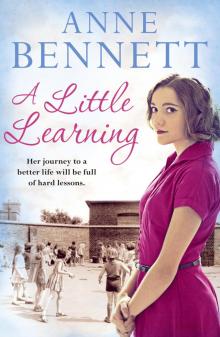 A Little Learning
A Little Learning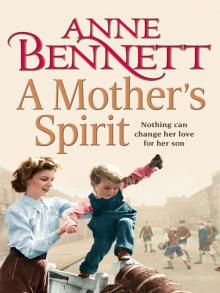 A Mother's Spirit
A Mother's Spirit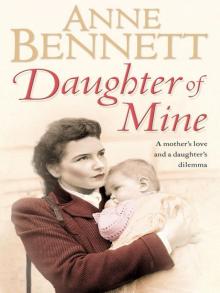 Daughter of Mine
Daughter of Mine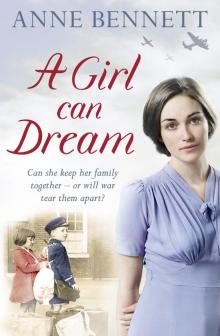 A Girl Can Dream
A Girl Can Dream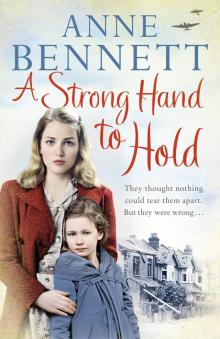 A Strong Hand to Hold
A Strong Hand to Hold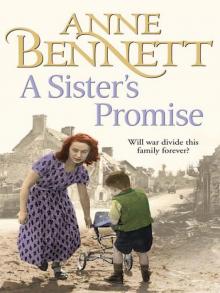 A Sister's Promise
A Sister's Promise To Have and to Hold
To Have and to Hold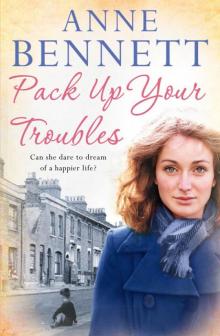 Pack Up Your Troubles
Pack Up Your Troubles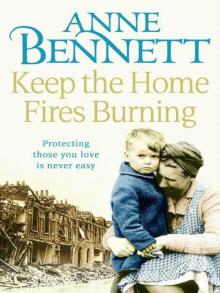 Keep the Home Fires Burning
Keep the Home Fires Burning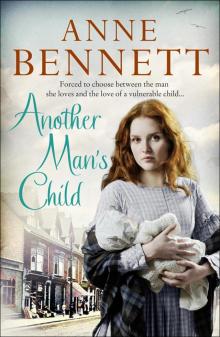 Another Man's Child
Another Man's Child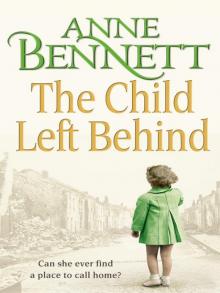 The Child Left Behind
The Child Left Behind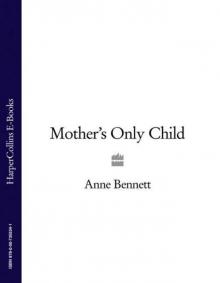 Mother’s Only Child
Mother’s Only Child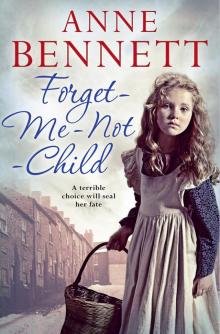 Forget-Me-Not Child
Forget-Me-Not Child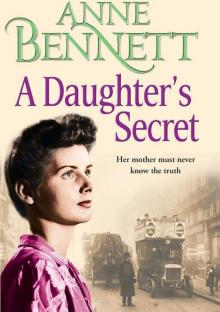 A Daughter's Secret
A Daughter's Secret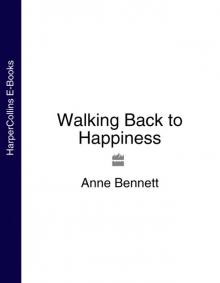 Walking Back to Happiness
Walking Back to Happiness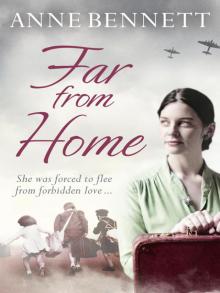 Far From Home
Far From Home Till the Sun Shines Through
Till the Sun Shines Through